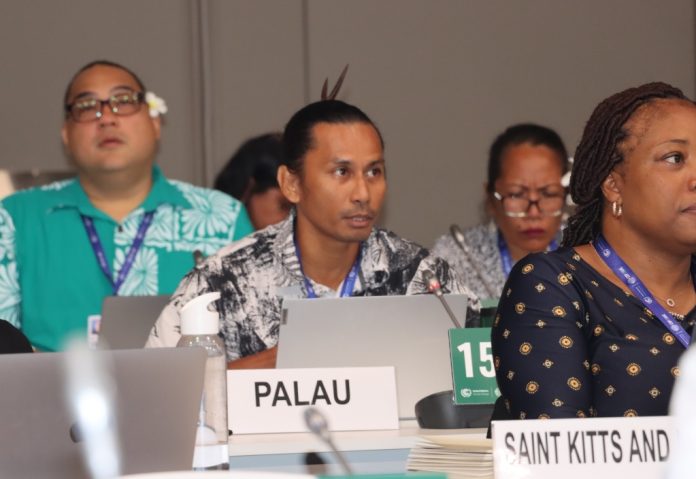By Pita Ligaiula at COP28 in Dubai, UAE
Palau’s climate change negotiator and Chair of Pacific Small Island Developing States(PSIDS), Xavier Matsutaro has emphasised the critical need for ambition and urgency at COP28, underscoring the pivotal role of emission reduction in the ongoing global climate negotiations.
“If I can sum it up into one word, it’s ambition, and call it across the board,” said Matsutaro, highlighting the overarching theme that echoes through the halls of COP28.
He stressed the urgency of setting ambitious targets for emission reduction, acknowledging that this is the linchpin to combatting the current trajectory of a three-degree Celsius temperature increase.
“At the heart of the conversation at this COP is emission reduction. We are really fighting hard to limit and reach that 1.5 degrees,” Matsutaro emphasised, noting the collective effort required to ensure a sustainable and resilient future.
Matsutaro pointed to the significance of the Global Stocktake, describing it as a critical aspect of COP28. This process involves taking stock of the commitments made under the Paris Agreement, identifying any shortfalls, and implementing action-oriented course corrections to prevent worsening climate conditions.
“The trajectory at the moment we’re looking at a three-degree Celsius increase. We are really fighting hard to limit and reach that 1.5 degrees. But if I were to narrow it down, it would be emission reduction,” he added, highlighting the central role of emission reduction in achieving climate goals.
Discussing another crucial aspect, Matsutaro delved into the challenge of operationalising Loss and Damage, an integral part of the climate conversation. He acknowledged ongoing discussions about which facility would provide support and emphasised the need for a robust baseline fund to ensure operationalisation in the coming year.
“There’s a lot of work to be done in those fronts,” he remarked, recognising the complexities involved in addressing Loss and Damage effectively.
Matsutaro emphasised the importance of securing finance for adaptation and developing countries’ ambitions, acknowledging the sheer volume of agenda items to be addressed.
“There are 90 agenda items and gives us about 1.5 hours that’s been allocated to us. That’s practically not possible,” he noted, highlighting the need for strategic time allocation and extensive dialogue during the two-week negotiation period.
“Potential for two weeks seems like a long time. But when you have 196 countries trying to prove anything, it can get very complicated because it’s a consensus process,” Matsutaro added, recognising the challenges of reaching consensus among a diverse array of nations.
As COP28 unfolds, Matsutaro’s insights underscore the urgency and complexity of the tasks at hand, emphasising the critical role of ambitious emission reduction targets in shaping the success of the global climate negotiations.
SOURCE: PACNEWS













